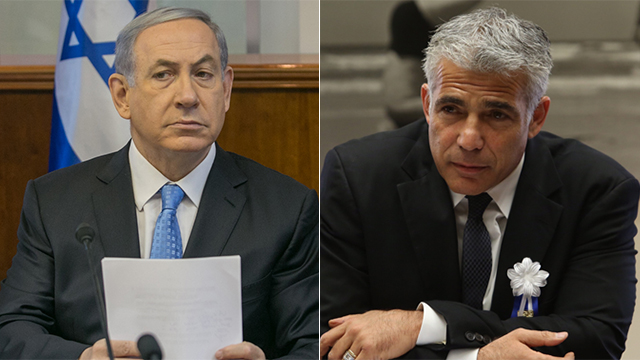

Netanyahu’s potential successors have nothing to offer
Op-ed: A significant part of the Israeli public is fed up with the prime minister's ongoing presence in its life and is willing, at least according to the polls, to vote for a different candidate. The problem is that apart from personal criticism against Netanyahu, there is no real criticism against his moves and policy.
The longer Prime Minister Benjamin Netanyahu remains in power, the more politicians try to market themselves as un-Bibi. The last one to grab the opportunity was former Minister Gideon Sa’ar. During the comeback celebration he organized for himself, he made sure to repeat every mantra that attracts applause at Likud Central Committee gatherings. Apart from that, he didn’t say a thing. (Eventually, it turned out that the whole comeback was a bluff too: Sa’ar kept attending Likud members’ events all along, together with his wife, journalist Geula Even-Sa’ar. The only difference is that now he is starting to collect donations for himself.)

The same applies to the other candidates seeking to inherit Netanyahu’s throne. They have nothing to offer apart from the fact that their name isn’t Netanyahu and that their spouse isn’t a child psychologist in the public service system. They have nothing to offer in the fields of security, social affairs, economy, culture and peace. They have personal criticism—either explicit or implicit—against Netanyahu, but they have no criticism against his policy.
Yesh Atid leader Yair Lapid is the most talented person in the un-Bibi league. He has chosen, in his own words, not to serve as an opposition—but to serve as an alternative. In other words, he has chosen to minimize his party’s battle against the government, a battle which would have painted him in leftist colors, and build his image as an improved Netanyahu.
As recent polls show, there is some marketing logic in Lapid’s decision. A significant part of the Israeli public is fed up with Netanyahu’s ongoing presence in its life and is willing, at least according to the polls, to say that it would vote for a different candidate. This part of the public, however, has no real criticism against the government’s moves and policy. Like in the old military joke, the good news is that we are going to change our underwear; the bad news is that we are going to change it with each other.
There is something outrageous, cynical and cowardly in this situation. There are much more difficult and complex dilemmas waiting in the horizon than the issue of Netanyahu’s next hair color. I’m not only referring to the Israeli-Palestinian conflict. The country is changing before our eyes: It is changing in its level of tolerance toward minorities, toward freedom of press, toward the Jewish religion’s place in legislation and in the national list of priorities. The growing income inequality is threatening our internal solidarity, the myth of a supportive society. The government is failing to provide answers to these questions. It uses some of them to incite Israelis against each other.
Netanyahu is providing Israelis with an illusion of a nonexistent status quo. Life can’t be frozen. Reality changes every day on the Jewish side of the West Bank—in the settlements—and on its Palestinian side. It changes in Gaza, it changes in the Middle East and it changes within Israeli society. The crisis will arrive, whether during Netanyahu’s era or later. What are his successors offering that he isn’t? Why go to the effort of replacing one leader with another if they’re all made of the same stuff?
















